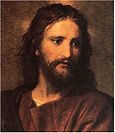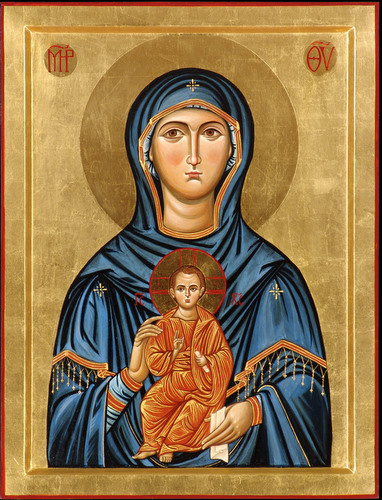Theotokos (Greek Θεοτόκος) is the most exalted Greek title given to Mary, the mother of Jesus. Its literal English translations include "God-bearer", "Birth-Giver of God" and "the one who gives birth to God." Less literal translations include "Mother of God". This title is a consequence of the Christian catholic and orthodox doctrine of the divinity of Jesus Christ, the Incarnate Son of God, "the Word made flesh" (John 1:14), the Second Person of the Blessed Trinity, as defined dogmatically against the teaching of Nestorius declared heretical by the Council of Ephesus 431.
Contents
Defending the divinity of Christ[edit]
According to this doctrine of the Council, Jesus is equally God with the Father and the Holy Spirit, one in divine being and substance of divinity and Godhead with the Father and the Holy Spirit as one God of three divine Persons. He is therefore God before his incarnation, God at the moment of his incarnation, and God in the womb of Mary, his true mother. There was never a moment from the instant of his incarnation that she was not his mother, and there was never a moment from the instant of his incarnation that he was not God and man. This title Theotokos is a doctrinal defense of the divinity of Jesus the incarnate Son of God and Son of Mary, God and man, the two natures of the one Person of Christ.
Some persons assume wrongly that all mothers precede the existence of their sons,[1] and that the title "Mother of God" blasphemously declares the false doctrine that she existed before Almighty God, as pagans in various parts of the ancient world (and in some places even today) believed in a Mother of the Gods, and this is adduced as proof that a Great Apostasy was committed by the Church and that the doctrines of the Catholic and Orthodox Churches are pagan. This grossly distorted misrepresentation of the meaning of the title of Mary as Theotokos is not the true teaching of Christianity, and in particular is not the dogmatic teaching of the Catholic and Orthodox Church.
Protestant Christian Evangelicals and Fundamentalists who reject the doctrine that Mary is the mother of God, are not aware that their rejection of this doctrine implicitly denies the eternal divinity of Jesus from the moment of his incarnation. With Nestorius they prefer to regard her as the mother of his humanity only and not mother of him who is God. According to Acts 20:28, the human blood of Jesus is the "blood of God":
- Take heed therefore unto yourselves and to all the flock, over the which the Holy Ghost hath made you guardians, to feed the church of God which he hath purchased with his own blood.
This truth contradicts the erroneous interpretation of some who point to Philippians 2:7, "he emptied himself", as proof that Jesus had divested himself entirely of his divine nature from the moment of his incarnation, throughout the whole of his earthly ministry, until his resurrection from the dead. In contradiction to this, mainstream Christian doctrine declares that there was never a moment that Jesus of Nazareth was not God. The reasoning of the Council of Ephesus, promoted by Saint Augustine, is that mothers are mothers of more than bodies, and are mothers of the persons conceived and born from their wombs, and nurtured and raised by them as their own children, and that Mary was authentically and really Jesus' mother, both by a divine miracle of supernatural grace and by nature. If Mary is not the mother of God, then Jesus was not God. He was God when he became man "and the Word became flesh and dwelt among us" (John 1:14). If Jesus is eternally God both before and from the moment of his incarnation, then Mary who carried him in her womb is his mother, and she is truly and actually the Mother of Jesus incarnate who is God and man. Both Orthodoxy and Catholicism see this as the highest and most unique privilege God ever bestowed on any human creature, and for this reason she was able to declare, "behold, from henceforth all generations shall call me blessed". And for this same reason, Catholics call her "The Blessed Virgin Mary".
Scriptural support for the doctrine that Mary is the Mother of God[edit]
Several passages of scripture state plainly that Mary is the mother of Jesus Christ the incarnate Son of God.
- Matthew 1:18 "as his mother Mary was espoused to"
- Matthew 2:11 "the young child with Mary his mother"
- Matthew 2:13 "take the young child and his mother"
- Matthew 2:14 "and took the young child and his mother"
- Matthew 2:20 "take the young child and his mother"
- Matthew 2:21 "took the young child and his mother"
- Matthew 12:46 "his mother and his brethren stood"
- Matthew 13:55 "is not his mother called Mary?"
- Mark 3:31 "then his brethren and his mother"
- Mark 3:32 "thy mother and thy brethren without"
- Luke 1:43 "the mother of my Lord should come to me"[2]
- Luke 2:33 "Joseph and his mother marveled"
- Luke 2:34 "and said unto Mary his mother, Behold"
- Luke 2:43 "Joseph and his mother knew not of it"
- Luke 2:48 "and his mother said unto him, Son"
- Luke 2:51 "his mother kept all these sayings in her heart"
- Luke 8:19 "then came to him his mother and his brethren"
- Luke 8:20 "thy mother and thy brethren stand without"
- John 2:1 "and the mother of Jesus was there"
- John 2:3 "the mother of Jesus saith unto him"
- John 2:5 "His mother saith unto the servants, Whatsoever he saith unto you, do it"[3]
- John 2:12 "and his mother, and his brethren"
- John 19:25 "stood by the cross of Jesus his mother"
- John 19:26 "When Jesus therefore saw his mother"
- John 19:27 "he saith unto his mother, Woman behold thy son!"
- Acts 1:14 "and Mary the mother of Jesus"
- See also Revelation 12:1-5.
The following verses demonstrate that Jesus Christ the Son of Mary was and still is the incarnation of God:
- Matthew 1:22 "Behold, a virgin shall conceive and bear a son, and his name shall be called Emmanuel (which means, God with us)."
- John 1:1 and 14 and 18 "In the beginning was the Word, and the Word was with God, and the Word was God. ... And the Word became flesh and dwelt among us, full of grace and truth; we have beheld his glory, glory as of the only Son from the Father. ... No one has seen God; the only Son,[4] who is in the bosom of the Father, he has made him known."
- John 5:17-18 "But Jesus answered them, 'My Father is working still, and I am working.' This was why the Jews sought all the more to kill him, because he not only broke the Sabbath but also called God his Father, making himself equal with God."
- John 8:58 "Before Abraham was, I AM."
- John 10:30 and 33 " 'I and the Father are one.' " ... "The Jews answered him, 'We stone you for no good work but for blasphemy; because you, being a man, make yourself God.' "
- John 14:9-11 "Jesus said to him, 'Have I been with you so long, and yet you do not know me, Philip? He who has seen me has seen the Father; how can you say, "Show us the Father"? Do you not believe that I am in the Father and the Father in me? The words that I say to you I do not speak on my own authority; but the Father who dwells in me does his works. Believe me that I am in the Father and the Father in me, or else believe me for the sake of the works themselves.' "
- John 16:15a "All that the Father has is mine..."
- John 20:28-29 "Thomas answered him, 'My Lord and my God!' Jesus said to him, 'Have you believed because you have seen me? Blessed are those who have not seen and yet believe.' "
- Colossians 1:15a "He is the image of the invisible God..."
- Colossians 1:19 "For in him all the fullness of God was pleased to dwell"
- Colossians 2:9 "For in him the whole fullness of deity dwells bodily"
- Hebrews 1:3 "He reflects the glory of God and bears the very stamp of his nature, upholding the universe by his word of power. When he had made purification for sins, he sat down at the right hand of the Majesty on high".
See also[edit]
Notes[edit]
- ↑ The same notion mockingly proposed by critics of Theism, and especially of Christianity, is that "if all things that exist have been created, then who created God?". They ignore the Judeo-Christian doctrine that God is specifically the One "Uncreated" reality, without beginning, without end, eternally self-existing and self-subsisting, Who created all other existing things visible and invisible, the heaven and the earth, from Whom all created things come, and are held in existence, and without Whom they all would cease to exist.
- ↑ "Lord", Greek Κύριος Kyrios, here and in other passages, 700 times in the New Testament, is the word for God. See Strong's number 2962. Thus Elizabeth, filled with the Holy Spirit Himself, declares Mary "mother of God - mother of my Lord".
- ↑ Mary here speaks through John's Gospel to every servant of the Lord, "Do whatever he tells you." This compact summary of the whole of the Bible from the lips of Mary is the constant teaching of the Orthodox and Catholic Church. See Luke 6:46; Matthew 7:21-23 and 18:15-18.
- ↑ "Son"—some ancient authorities read "God"—"the only God, who is in the bosom of the Father"
External links[edit]
- Theotokos - OrthodoxWiki (orthodoxwiki.org)
- Nativity of the Theotokos - OrthodoxWiki (orthodoxwiki.org)
- The Dormition of the Theotokos - Orthodox Metripolitinate of Hong Kong and South East Asia (omhksea.org)
- Icons of the Theotokos - OrthodoxWiki (orthodoxwiki.org)
- 0431–431 –Concilium Ephesenum – Documenta Omnia. The Third Ecumenical Council. The Council of Ephesus (70 pages) pdf (documentacatholicaomnia.eu)
- (to successfully access this document from this page highlight and copy the following address below - http://–to–.pdf - exactly as it appears here and enter it into the top online search window. — include [Schaff],_EN.pdf )
- The Council of Ephesus – 431 A.D. (papalencyclicals.net) —includes letters regarding Nestorius
- The Canons of the Ecumenical Councils of the Eastern Orthodox Church: Council of Ephesus (431) (sites.google.com)
- Protestant views on Mary - Wikipedia (en.wikipedia.org)
- THEOTOKOS in Protestant Theology, Marvil N. Llasos, O.P. (academia.edu)
- How Can Mary Be God's Mother? (catholic.com) —Protestant objections from the Bible
- Do Catholics worship a pagan goddess in the disguise of Mary? (catholicbridge.com) —the goddess Gaia, syncretism, Collyridians, the Mother of God a goddess, the pagan goddess Ishtar, "Queen of Heaven", Mother and child statues, New Age, Goddesses

